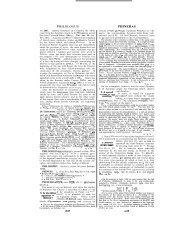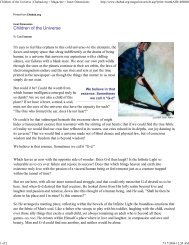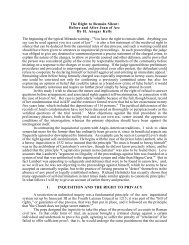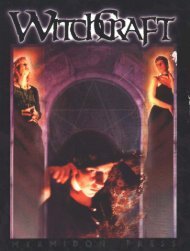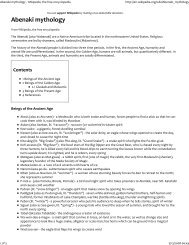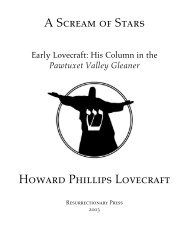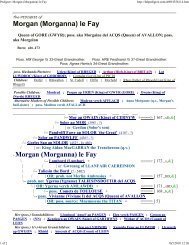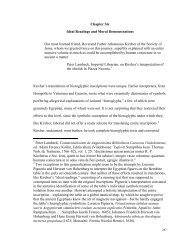sefi;g:v. - A Kabbalist walks into a bar, and the
sefi;g:v. - A Kabbalist walks into a bar, and the
sefi;g:v. - A Kabbalist walks into a bar, and the
You also want an ePaper? Increase the reach of your titles
YUMPU automatically turns print PDFs into web optimized ePapers that Google loves.
SCYTHIANS SCYTHIANS<br />
Originally <strong>the</strong> Hebrew word may have been pronounced<br />
Aikunza (:I@$#, !?@E, I!???, UzvE, I>?@); it is as Delitzsch<br />
h& pointed out (see ASHKENAZ) identical with<br />
2. Ashkenaz AHkuza <strong>and</strong> Iikuza occurring in Assyrian in-<br />
= Sqrthim. scriptions (see 5 6). In <strong>the</strong> Behistfin inscription<br />
<strong>the</strong> Saka chief Shuka is called, in <strong>the</strong> Susian<br />
version Iskunka. Already Vater (Comm. 1802, p. 100) observed<br />
that a &ne beginning with Sc would he Suitable on account of<br />
<strong>the</strong> pros<strong>the</strong>tic A, E, or I. The essential part of <strong>the</strong> name seems<br />
to he Sku : cp ZXU-A~S, ZKO-AO~OL, IKW-=~ULS, Chinese Szii,<br />
Persian Sa-ka. ASkuza-Skuza is apparently <strong>the</strong> origin of<br />
Pd@S.<br />
In Gen. IO3 <strong>the</strong> Scythian is, <strong>the</strong>n, regarded as a son<br />
of <strong>the</strong> Kimmerian (GOMER, Gimirra, Gamir. Kr,u,udpioc)<br />
pal Gngi still lingered in <strong>the</strong> neighbourhood of Urartu<br />
as <strong>the</strong> name of a chief of Sahi (Cyl. B. 41Jj. 'l'hat<br />
<strong>the</strong> memory of Gog as a people was not lost IS shown<br />
by Rtv. 208. Ewald rightly felt that <strong>the</strong> phrase ' Gog<br />
<strong>and</strong> Magog ' was not <strong>the</strong> creation of <strong>the</strong> NT apocalytic.<br />
After <strong>the</strong> name Gogarene had attached itself to <strong>the</strong><br />
territory occupied by Scythians, at least since <strong>the</strong> beginning<br />
of <strong>the</strong> seventh century B.c., Gog naturally was<br />
understood as a Scythiau people, whatever its original<br />
character may have been.<br />
As, according to Ezek. 3617, <strong>the</strong> coming of Gog,<br />
prince of Meshech <strong>and</strong> Tubal, had been predicted by<br />
<strong>and</strong> a bro<strong>the</strong>r of Kiphath <strong>and</strong> Togarmah, whilst in Jer.<br />
5 1 27 he appears as <strong>the</strong> companion of <strong>the</strong> Mannzean <strong>and</strong><br />
Urartzan. The author of Jer. 50-51 58, whose production<br />
is largely a patchwork of quotations, seems to have<br />
Gag., <strong>the</strong> former prophets, Jerome looked for<br />
4. I<br />
such a prophecy <strong>and</strong> found it in Nu.<br />
227 where d <strong>and</strong> Sam. with Aq. Sym. read 'his king<br />
shall be higher than Gog.' There can be little doubt<br />
used in 51 27 some old writing now lost, since <strong>the</strong> connection<br />
of MINNI <strong>and</strong> ARARAT (qq.".) with Ashkenaz<br />
reflects a definite historical situation centuries before his<br />
own time (cp JEREMIAH [BOOK], § 20, viii.). Whe<strong>the</strong>r<br />
Riphath <strong>and</strong> Togarmah were current designations of<br />
certain countries in <strong>the</strong> N. at <strong>the</strong> time of <strong>the</strong> priestly<br />
editor of <strong>the</strong> Pentateuch, or likewise drawn from some<br />
older source, must be left in doubt.<br />
It has also been maintained that <strong>the</strong> Scythians are<br />
alluded to under <strong>the</strong> names Gog <strong>and</strong> Magog. Magog<br />
md was interpreted & Scythians Gy Josep&<br />
3.<br />
(Ad. i. 61 [I IZ~]), Jerome, Theodoret,<br />
Mwog' <strong>and</strong> o<strong>the</strong>rs. The fact that Gomer (Kimmerian),<br />
Madai (Mede), Javan (Greek), Meshech( Moschi),<br />
Tubal (Ti<strong>bar</strong>enes), <strong>and</strong> Tiras (TurSa, Tyrrhenians) are<br />
so manifestly names of famous nations renders it quite<br />
certain that, if <strong>the</strong> word has been accurately transmitted,<br />
or formed at all a part of <strong>the</strong> original text, Magog must<br />
also represent <strong>the</strong> name of a well-known people. It<br />
must be confessed that <strong>the</strong> absence of so important a<br />
name alike in cuneiform <strong>and</strong> classical sources makes one<br />
suspect <strong>the</strong> correctness of <strong>the</strong> name.<br />
This has led Cheyne to suppose a dittography of lp2 in Gen.<br />
10 2, <strong>and</strong> a corruption of P7+i in Ezek. 38 f: (see GOG AND<br />
ilIAGOG, n.). The interpretation of ARMAGEDDON (q.7~) by this<br />
szholar is indeed as plausible as it is brilliant. It seems doubtful<br />
however, whe<strong>the</strong>r <strong>the</strong> new-found chthonic divinity will be ok<br />
service in Ezek. 3R (cp textual corrections in col. 3881, n. I, <strong>and</strong><br />
fur <strong>the</strong> opposite view that a great historic personage is reflected<br />
by <strong>the</strong> Gog of Ezek 38 see 8 5). A simpler suggestion as to Gen.<br />
that this is more original than MT, though <strong>the</strong> whole<br />
verse is probably a late interpolation. [Cp OG, col.<br />
3465.1<br />
Peyron (Sur Zes prophPles, 1693, p. 136J) called attention t:<br />
Am. 7 IC where @ read '<strong>and</strong> behold one caterpillar, king Gog,<br />
<strong>and</strong> made this passage refer to a Sc;thian invasion. Here, too,<br />
<strong>the</strong> Hebrew text gives no satisfactory sense, <strong>and</strong> Nowack rightly<br />
rejects it as a gloss.2 Q3 probably reproduces more nearly <strong>the</strong><br />
words of <strong>the</strong> dossator : but it mav be anestioned whe<strong>the</strong>r <strong>the</strong><br />
original read 111 Sn 'king of Gkg,' 0; 7Snn 111, 'Gog; <strong>the</strong><br />
king.' If.'king 02 GLg' was <strong>the</strong> reading 'Gog <strong>the</strong> king, <strong>and</strong><br />
with it 'king Gog' himself, may have ori&nated in a misnnderst<strong>and</strong>ing<br />
of-this marginal comment to Am. 7 I. But <strong>the</strong> idea of<br />
this king may also have been suggested by descriptions of Gagi,<br />
ruler of Sahi given by some of Ah-bani-pal's Syrian colonists,<br />
unless it sh%d ultimately prove to have its roots in Babylonian<br />
mythology wherea divinemessenger Gaga fi res in <strong>the</strong> fnuma<br />
flitepic, 3LJ 67. That <strong>the</strong> descriptions of sr. 4-6 <strong>and</strong> Zeph. 2<br />
(see B 6 <strong>and</strong> ZEPHANIAH 8 4) cannot by <strong>the</strong>mselves have led<br />
to <strong>the</strong> definite conceptio; of king Gog, is sufficiently evident<br />
from Jewish <strong>and</strong> Christian exegesis. which so long has been<br />
satisfied (but see $ 27, <strong>and</strong> Crit. Bib.) with seeing in <strong>the</strong>se<br />
passages references to <strong>the</strong> Chaldzans only.<br />
That, with all its apocalyptic character, Ezek. 38-39<br />
reflects <strong>the</strong> career of a - ereat historic Dersonaee. ". was<br />
already felt by Polychronius (about 427<br />
6.<br />
A.D.) who thought of Antiochus 111.<br />
=Gogof He was followed in this by Grotius,<br />
Exek.38.<br />
whose commentarv Fives a detailed<br />
application of <strong>the</strong> text to <strong>the</strong> historyof <strong>the</strong> Seleucid<br />
king. Winckler most ingeniously interprets <strong>the</strong> prophecy<br />
as occasioned by <strong>the</strong> career of Alex<strong>and</strong>er (A OF 21608).<br />
But nei<strong>the</strong>r Antiochus nor Alex<strong>and</strong>er would naturally be<br />
102 would he that Magog (111~) was miswritten for Gog (111)<br />
under <strong>the</strong> influence of 'Madai' (qn), as a consequence of a<br />
changed conception of Gog, because at one time it was customary<br />
to contract <strong>the</strong> Assyrian mlt Gag <strong>into</strong> Magag (Streck), or as a<br />
designation of a people akin to <strong>the</strong> Scythians <strong>and</strong> derived from<br />
designated ' prince of Meshech <strong>and</strong> Tubal,' <strong>and</strong> <strong>the</strong>re is<br />
in nei<strong>the</strong>r case any motive for <strong>the</strong> feeling of hostility<br />
displayed, whilst <strong>the</strong>re is evidence of a different disposition<br />
toward <strong>the</strong>se kings on <strong>the</strong> part of <strong>the</strong> Jews.<br />
Gog(]iin), such as <strong>the</strong> Sarmatians or Massagetz. It is interesting<br />
that Saadia in this place has jljM9 (ed. Derenbourg), <strong>the</strong><br />
customary rendering of ]I] at his time; cp Kur'gn 2196 <strong>and</strong><br />
Arabic writers quoted by Herbelot. In Ezek. 38 2, 'l<strong>and</strong> of <strong>the</strong><br />
Magog' (113~n yi~) is apparently an interpolation (Stade), <strong>and</strong><br />
The present writer would suggest that <strong>the</strong> conqueror<br />
whose career inspired this prophecy is far more likely<br />
to have been Mithridates VI. Eupator Dionysus of<br />
Pontus.<br />
in Ezek. 39 6 <strong>the</strong> original seems to have been Gog (@BQ). [On<br />
Ezek. 38 see fur<strong>the</strong>r Crit. Bib.] In Targ. Jer. 1 to Nu. 11 26<br />
311n~ N ~ R[D X 350 w,$n, 'a king shall arise from <strong>the</strong> l<strong>and</strong> of<br />
Ma og,' depcnas on Ezek. 38 2, while in Targ. Jer. 2 jiini 111<br />
,.&, ' Gog <strong>and</strong> Magog <strong>and</strong> his armies,' irini is probably an<br />
Mithridates alone could rightly be entitled 'prince of Meshech<br />
<strong>and</strong> Tubal,' his seat of power being where <strong>the</strong> Moschi <strong>and</strong> <strong>the</strong><br />
Tiharenes lived, <strong>and</strong> his sway extending over <strong>the</strong> territory once<br />
associated with those names. None could more aptly be considered<br />
as <strong>the</strong> coming Gog than <strong>the</strong> proud conqueror of Scythia<br />
who reigned over all <strong>the</strong> coast-l<strong>and</strong>s of <strong>the</strong> Black Sea <strong>and</strong> brought<br />
from <strong>the</strong> far<strong>the</strong>st N. his armies. No o<strong>the</strong>r ruler of <strong>the</strong>se realms<br />
had with him Paras Cush, <strong>and</strong> Put, Gomer, Togarmah, <strong>and</strong> <strong>the</strong><br />
extreme N. than Mithridates, whose general Pelopidas could<br />
justly boast of <strong>the</strong> Persian auxiliaries, E ptian shi s, Cappadocian<br />
troops, Armenian contingents, <strong>and</strong> Ycythian Earmatian,<br />
Bastarnian, <strong>and</strong> Thracian hordes that swelled <strong>the</strong> ding's forces.<br />
Mithridates' dark iytrigues, his Poundless ambition, his insatiable<br />
greed, <strong>the</strong> 'Ephesian vespers with <strong>the</strong>ir 80,000 victims, <strong>the</strong><br />
persecutions of <strong>the</strong> Jews in Cos <strong>and</strong> elsewhere, who were at <strong>the</strong><br />
time warm friends <strong>and</strong> allies of Rome, must, in 88 B.c., have filled<br />
many a heart in Palestine with fear of an invasion, hatred <strong>and</strong><br />
abomination. But in an age of eschatological hopes <strong>the</strong>'confidence<br />
could not ;ail that should he invade <strong>the</strong> 'na;el of <strong>the</strong><br />
earth' where quiet <strong>and</strong> proiperity had been restored, <strong>and</strong> prove<br />
indeed to be <strong>the</strong> predicted Gog, he would <strong>the</strong>re meet with a<br />
miserable end. By <strong>the</strong> sword of <strong>the</strong> faithful <strong>and</strong> <strong>the</strong> wrath of<br />
heaven he would perish, <strong>and</strong> his hosts would be buried during<br />
interpolation ; but Magog seems to be <strong>the</strong> name of a king, as it<br />
certainly is in Targ. Jon. to I S. 2 io.<br />
Amenhotep 111. (Am. Tab. 1 383) mentions three<br />
countries-Gag, Hanigalbat, <strong>and</strong> Ugarit. Hanigalbat<br />
is probably Melitene, <strong>and</strong> Gog is likely to have been<br />
situated NE of Commagene (Streck, ZA 1532:). A<br />
people called Gag, or Gog, was thus known in <strong>the</strong><br />
fifteenth century B. c. Concerning its ethnic relations<br />
me as yet know nothing. In view of <strong>the</strong> marked Iranian<br />
character of some names in <strong>the</strong> ilmarna letters (see § 13).<br />
it is not too bold an assumption that Gag may have<br />
been a forerunner of ASkenaz in Anatolia belonging to<br />
<strong>the</strong> same family. Like <strong>the</strong> MuSki, <strong>the</strong> KaSki, <strong>the</strong><br />
Tubali, <strong>and</strong> <strong>the</strong> Haldi, <strong>the</strong> Gagi may have been driven<br />
N. by new invaders ; <strong>and</strong> it is significant that, in <strong>the</strong><br />
days of Strabo, <strong>the</strong>re was a province Gogarene im-<br />
mediately E of <strong>the</strong> territory occupied by <strong>the</strong> Moschi,<br />
<strong>the</strong> Colchians, <strong>the</strong> Ti<strong>bar</strong>enes, <strong>and</strong> <strong>the</strong> Chaldaeans (Geogr.<br />
11 14, pp. 45zJ ed. Didot). In <strong>the</strong> time of ASur-bani-<br />
4331<br />
1 MT 3 3 : ~ <strong>the</strong> addition of <strong>the</strong> pros<strong>the</strong>tic N may be explained<br />
as in Arab. dJ@' for ])I in Ezek. 38 z AI.<br />
-2 [This alternative can, it would seem, be avoided by <strong>the</strong><br />
course suggested in LOCUSTS, 5 3 with note 6. Cp Crit. Bib.<br />
ad Zoc. I<br />
4332



